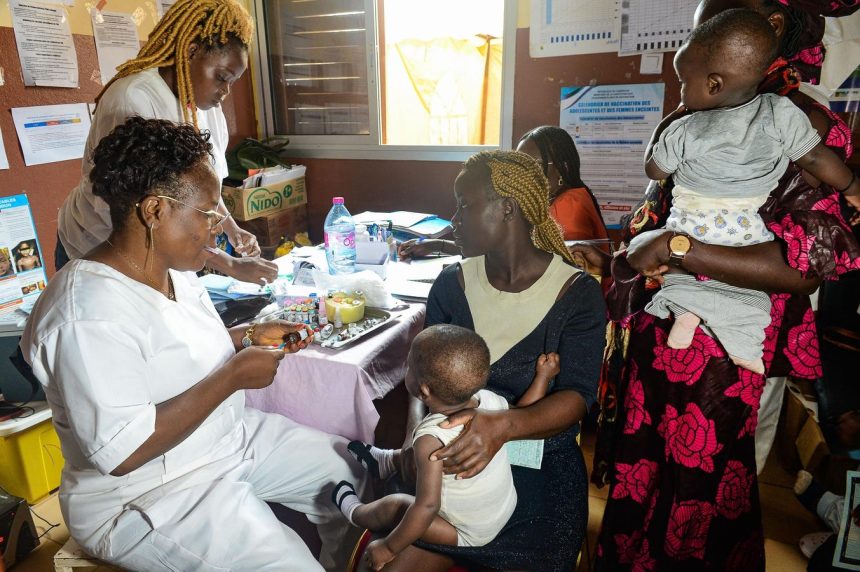Prossy Muyingo, a community health worker in Uganda, faces the harsh realities of a sudden US foreign aid freeze amidst a new Ebola outbreak. Her work, crucial in bridging the gap in healthcare access, is now threatened, leaving her patients vulnerable and uncertain about their access to essential medications like antiretrovirals for HIV. Muyingo’s personal struggles mirror those of her patients, as her family relies on her modest income and faces difficulties affording treatment for her child’s sickle cell disease. The aid freeze has created a ripple effect of fear and uncertainty, impacting not only healthcare services but also the livelihoods of dedicated health workers like Muyingo.
The abrupt halt in aid, initiated by the new US administration, has caused widespread disruption in global health initiatives. From clinic closures in South Africa to stalled food aid in Mozambique, the impact is devastating. The justification for the freeze, rooted in mistrust of aid organizations’ reporting, ironically undermines the very mechanisms that ensure accountability. The lack of clear guidance on what constitutes “lifesaving assistance” further exacerbates the chaos, leaving organizations scrambling to decipher ambiguous exceptions and submit waiver requests through a confusing system. The arbitrary nature of the freeze is highlighted by the initial example of condoms in Gaza, a program that didn’t even exist, further underscoring the disconnect between rhetoric and reality.
The freeze’s impact extends beyond immediate healthcare needs, jeopardizing long-term public health programs. Olivia Ngou, executive director of Impact Santé Afrique, highlights the critical disruption to malaria prevention and treatment efforts in Cameroon. The suspension of aid hinders preparations for the rainy season, a period of heightened malaria risk, and disrupts the timely delivery of essential medications and mosquito nets. The delay in testing and treatment can have life-threatening consequences, particularly for children vulnerable to severe malaria. The uncertainty surrounding the aid freeze undermines years of progress in combating malaria, a disease that, despite significant advancements, remains a persistent threat.
The stated objective of the aid freeze – to make America “safer, stronger, and more prosperous” – clashes with the reality on the ground. The freeze targets programs that contribute to global health security and stability, including pandemic preparedness and initiatives supporting vulnerable populations. These programs, far from being charitable handouts, represent smart investments in global health that ultimately benefit the US as well. The cost-effectiveness of aid is demonstrably evident in malaria interventions, where mosquito nets and preventative treatments have proven highly effective in saving lives and reducing the burden of disease. The interruption of these programs not only jeopardizes lives but also undermines long-term progress and stability.
The human cost of the aid freeze is starkly illustrated by the potential consequences for malaria control. Malaria No More estimates that the 90-day freeze could result in over 1,000 preventable deaths per day, primarily among children. This tragic outcome undermines the significant progress made in reducing malaria mortality rates over the past two decades, a testament to the effectiveness of US-led initiatives like the President’s Malaria Initiative (PMI). The freeze not only disrupts the delivery of life-saving interventions but also hinders the development and implementation of innovative solutions, such as the malaria vaccine, further jeopardizing vulnerable populations.
While the justification for the aid freeze centers on US interests, the global health community emphasizes the interconnectedness of health and security. Aid organizations, faced with the stark reality of funding cuts, are increasingly forced to frame their work in terms of US security and geopolitical interests, even if it means compromising the core ethical principles of humanitarian aid. This shift in focus, while potentially effective in securing funding, raises concerns about the politicization of aid and the potential for neglecting the most vulnerable populations. Prossy Muyingo’s plea for cooperation underscores the shared responsibility in addressing global health challenges, highlighting the importance of international collaboration in overcoming diseases that transcend borders. The aid freeze not only undermines this crucial partnership but also jeopardizes the health and well-being of millions worldwide.



